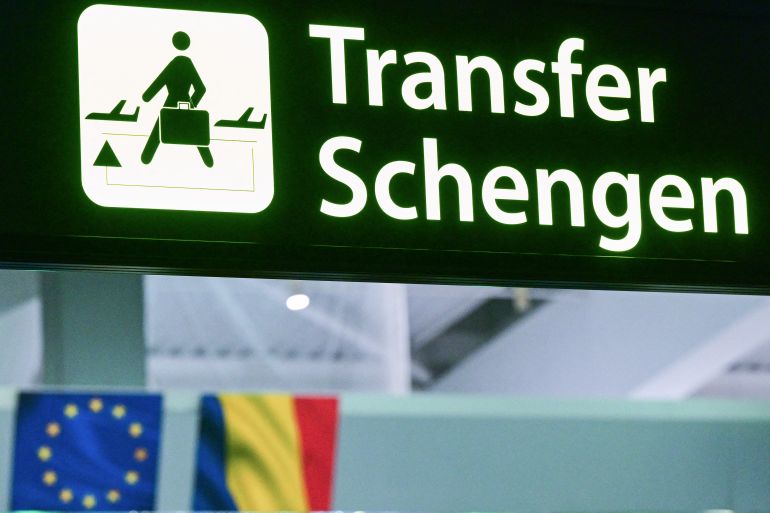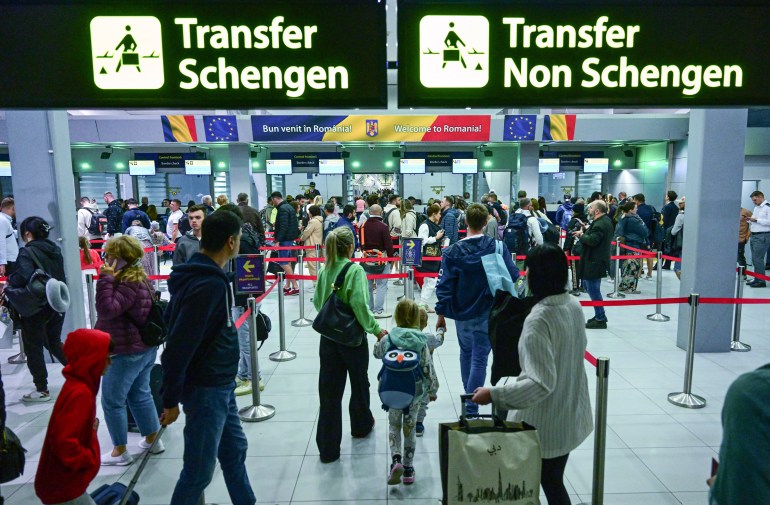Bulgaria and Romania partially join Europe’s Schengen area
Schengen rules are not yet applicable to land borders due to Austria’s concerns over undocumented migration.

After a 13-year wait, Bulgaria and Romania have partially joined Europe’s Schengen area of free movement.
The two countries reached an agreement late last year to join the continent’s free-travel area by air and sea after Austria opposed full membership, including land crossings, saying Romania and Bulgaria needed to do more to prevent irregular migration.
Keep reading
list of 3 itemsFinland to close all but one of its border crossings with Russia
Hungary frees more than 1,400 foreign convicts, angering the EU
Despite the partial membership, lifting controls at the two countries’ air and sea borders on Sunday has significant practical and symbolic value.
“Of course this is a very beautiful achievement for Bulgaria which makes things easier for us, as Bulgarians,” said Mincho Yurukov, who arrived at Sofia airport from Berlin on Sunday.
“Also, we feel like Europeans. That is a very important thing, the flight is much nicer, no checks.”
Created in 1985, the Schengen area allows more than 400 million people in the European Union to travel freely without internal border controls.
As partial members, the Schengen zone now comprises 29 members – 25 of the 27 EU member states as well as Switzerland, Norway, Iceland and Liechtenstein.
“I welcome the lifting of internal air and sea border checks. This is a great success for both countries,” European Commission President Ursula von der Leyen said in a statement.
“Together, we are building a stronger, more united Europe for all our citizens,” she said.
Calls for extension
While some travellers have reason to celebrate, truck drivers, faced with long queues at borders with their European neighbours, feel left out.
One of Romania’s main road transport unions, the UNTRR, has called for “urgent measures” to get full Schengen integration, deploring the huge financial costs caused by the long waits.
“Romanian hauliers have lost billions of euros every year, just because of long waiting times at borders,” UNTRR secretary-general, Radu Dinescu, said.

According to the union, truckers usually wait eight to 16 hours at the border with Hungary, and from 20 to 30 hours at the Bulgarian border, with peaks of three days.
Bulgarian businesses have also voiced their anger over the slow progress.
“Only 3 percent of Bulgarian goods are transported by air and sea, the remaining 97 percent by land,” said Vasil Velev, president of the Bulgarian Industrial Capital Association (BICA).
“So we’re at 3 percent in Schengen and we don’t know when we’ll be there with the other 97 percent,” he told the AFP news agency.
Bucharest and Sofia have said there will be no going back.
“There is no doubt that this process is irreversible,” Romanian Interior Minister Catalin Predoiu said this month, adding, it “must be completed by 2024 with the extension to land borders”.
Migration management
One of the key reasons behind Schengen rules not being applicable to Bulgaria and Romania’s land borders is Austria’s concerns over how Sofia and Bucharest manage irregular migration through these borders.
Bulgaria’s Interior Minister Kalin Stoyanov told journalists on Sunday that the country should become a full member of the Schengen zone by the end of this year, meaning border checkpoints will be removed for people and goods travelling by road and rail as well.
The Romanian prime minister has also said the country expects to finish negotiations on land borders this year.
The two countries have joined a regional police initiative with Austria, Greece and Slovakia to counter the flow of irregular migration and the EU’s border agency Frontex also said last month that it would triple the number of its officers in Bulgaria to help stem the amount of people crossing into the bloc from Turkey.